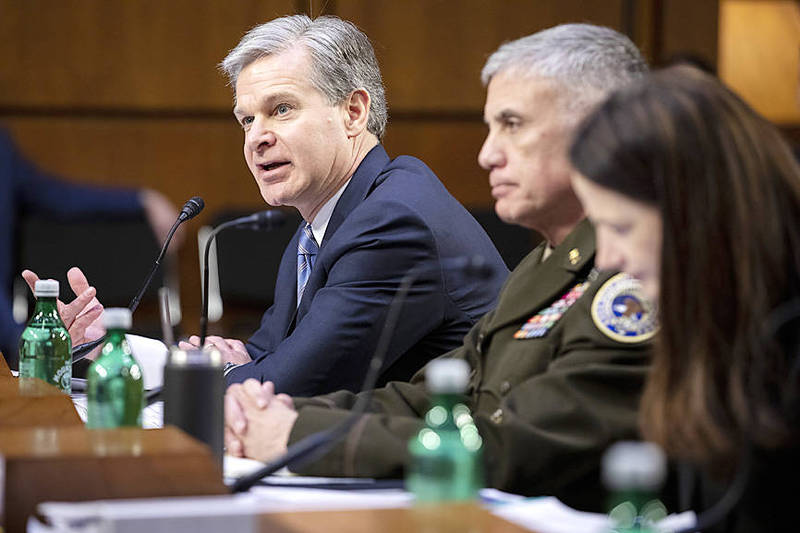《TAIPEI TIMES》Beijing to increase unification pressure on Taiwan, US intelligence report says

FBI Director Christopher Wray, left, speaks during a US Senate Intelligence Committee hearing on Capitol Hill in Washington on Wednesday. Photo: AP
Staff writer, with CNA and Reuters
Beijing is to continue to press Taiwan on unification and try to undercut US influence in the region as Chinese President Xi Jinping (習近平) begins his third term, an annual report by the US intelligence community said.
The conclusions were made as part of the “Annual Threat Assessment of the US Intelligence Community” issued by the Office of the Director of National Intelligence (ODNI), which was presented to the US Congress on Wednesday.
As Xi begins his third term, the Chinese Communist Party (CCP) would strive to press Taiwan on unification, undercut US influence, and drive a wedge between Washington and its partners, the report said.
Beijing sees US-China relations as part of an “epochal geopolitical shift,” and therefore views Washington’s measures against it as part of a broader US effort to “prevent China’s rise and undermine the CCP’s rule,” it said.
China was increasingly combining its growing military power with its economic, technological and diplomatic influence to entrench its rule, bolster its territorial claims and pursue global influence, the report said.
However, China also faces challenges from an aging population, high levels of corporate debt and economic inequality, as well as resistance in Taiwan and elsewhere to its “heavy-handed tactics,” it said.
On the issue of Taiwan, the report said that Beijing would this year continue to apply pressure and possibly offer inducements for Taiwan to move toward unification, while also reacting to what it views as increased US-Taiwan engagement.
For example, Beijing could take “stronger measures” to push back on perceived increased support for Taiwan, such as sending more vessels across the median line of the Taiwan Strait or firing missiles over Taiwan proper.
If Beijing succeeds in its goal to establish control over Taiwan, there would be “wide-ranging effects,” the report said, including a disruption of global semiconductor supply chains, “because Taiwan dominates production of cutting-edge chips.”
Beijing would likely continue using its military to “intimidate rival claimants” in the South China Sea and signal that it has effective control over contested areas, the report said.
The report also contained sections on Russia, Iran and North Korea, as well as on the topics of “climate change and environmental degradation,” “health security,” “additional transnational issues,” and “conflicts and fragility.”
Separately, FBI Director Christopher Wray told a US Senate hearing that the Chinese government could use TikTok to control data on millions of American users, saying the Chinese-owned video app “screams” of security concerns.
Wray told a Senate Intelligence Committee hearing on worldwide threats to US security that the Chinese government could also use TikTok to control software on millions of devices, and drive narratives to divide Americans over Taiwan or other issues.
“Yes, and I would make the point on that last one, in particular, that we’re not sure that we would see many of the outward signs of it happening if it was happening,” Wray said of concerns China could feed misinformation to users.
“This is a tool that is ultimately within the control of the Chinese government — and it, to me, it screams out with national security concerns,” Wray said.
The White House backed legislation introduced on Tuesday by a dozen senators to give US President Joe Biden’s administration new powers to ban TikTok and other foreign-based technologies if they pose national security threats.
The endorsement boosted efforts by a number of lawmakers to ban the popular app, which is owned by ByteDance Ltd (字節跳動) and used by more than 100 million Americans.
Other top US intelligence officials including Director of National Intelligence Avril Haines, CIA Director William Burns and National Security Agency Director Paul Nakasone agreed at the hearing that TikTok posed a threat to US national security.
新聞來源:TAIPEI TIMES



















